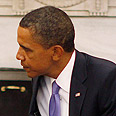
Lofty words, little hope
Op-ed: US expectations that talks would lead to fundamental breakthrough very low
WASHINGTON – As direct talks were about to be festively launched in Washington, US President Barack Obama was completely preoccupied with other wars. While Netanyahu, Abbas, Mubarak and Abdullah were making their way to the American capital, Obama left town in favor of a visit to the Fort Bliss base in El Paso, Texas, for a meeting with troops returning from the war in Iraq.
However, given realities on the ground, where explosion sounds still shake up Iraq, and with about 50,000 US troops still in the country for “guidance missions,” Obama also knows that we may have not yet seen the last US casualty.
Against this backdrop, and as direct talks were about to get underway, Obama made time for only one meeting with his special envoy, George Mitchell, who was asked to provide an up-to-date briefing about the state of affairs a moment before the negotiators sit at the table
In the days before that, the president’s schedule was also packed with various events. On Sunday, the US marked “New Orleans Day” to commemorate the five-year anniversary of the Hurricane Catherine disaster. On Monday, he devoted much time to the economic trouble, the almost sole issue that truly preoccupies the American public on a daily basis. Nonetheless, the Middle East managed to make an appearance in the daily briefing, with two questions (one about the settlement construction freeze and another about Iraq) coming up amidst the economic affairs.
The preoccupation with the Middle East, at this time of all times, has provoked criticism against Obama. During the abovementioned briefing, one journalist stood up and asked the president and his spokesman about the focus on Iraq and the Middle East, and whether it conveys a message to concerned citizens that the white House is not sufficiently focused on the economy.
It was hard not to notice the unease of White House Spokesman Robert Gibbs in the face of this question and the implied charges. After searching for the right words to negotiate the minefield laid for him, he said that he believes US citizens understand that the president deals with more than one issue per day, and that the fact he dealt with Iraq that day did not imply that he does not devote time to economic developments.
Terrible month for Obama
The Americans, as usual, will launch the direct talks between Israel and the Palestinians in a festive event – something they do better than anyone else in the world. Yet despite all, the atmosphere there too is mostly pessimistic, while expectations that the talks would lead to a fundamental breakthrough are very low.
In fact, it appears that officials in Washington would have preferred to do without the summit. It was set for an inconvenient time for President Obama, as the economic crisis increasingly erodes his status and he is engaged in a war of survival in a bid to avert a severe blow in the November 2 elections. In a Gallup poll published Monday, the Republicans enjoyed overall support of more than 10% above their Democratic rivals.
Against this backdrop, it appears that the Mideastern leaders in Washington will find an American president who isn’t in very high spirits. August was a terrible month for him with harsh news of an unemployment rate that approaches the 10% mark, a real-estate nadir that hasn’t been seen since 1994, and commentators again wondering whether America’s economy is again facing the threat of recession.
Neither Netanyahu nor Abbas will arrive at the event overly cheerful; in any case they were dragged there involuntarily, just because the Obama Administration decided that September 26 is a date that cannot be reached without eliciting some agreement between the sides regarding the settlement construction freeze.
Despite the far-reaching declarations about the aspiration to secure peace within a year, the real objective appears to be an effort to put the crisis in order in order to prevent further deterioration. Obama cannot afford to clash with his Jewish voters on the eve of the Congress elections; however, as noted, the Middle East is not his top priority at this time regardless. Currently, the president is much more concerned about allaying the growing anger of America’s jobless.
- Follow Ynetnews on Facebook










